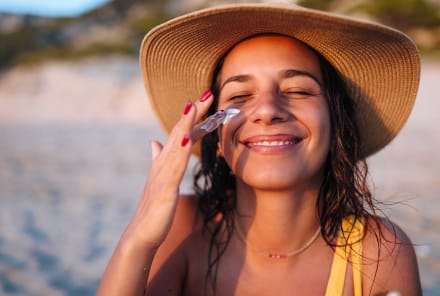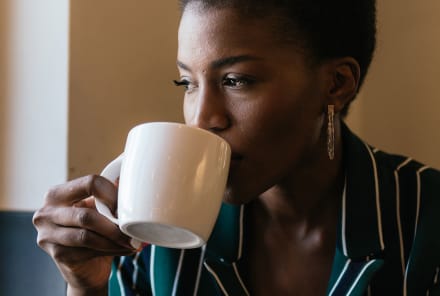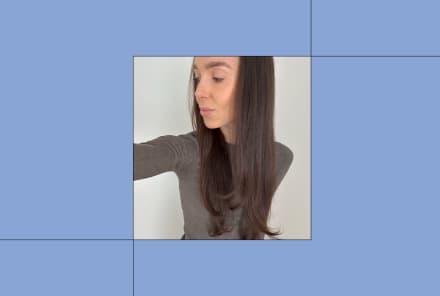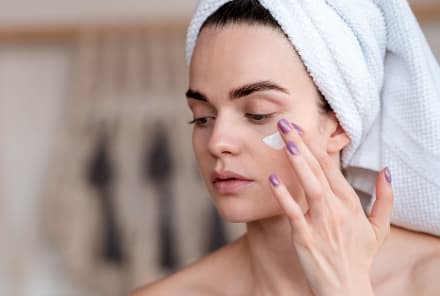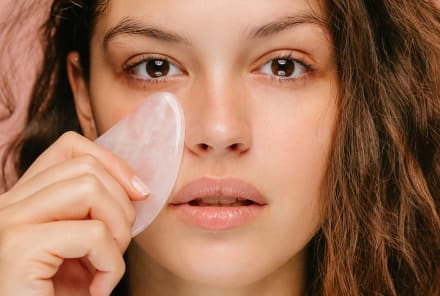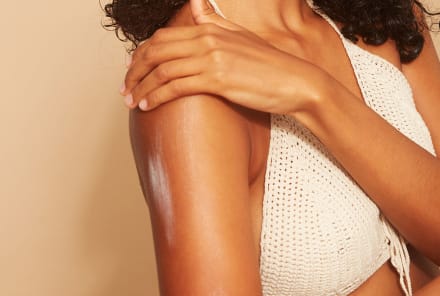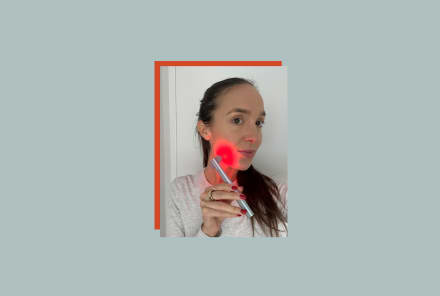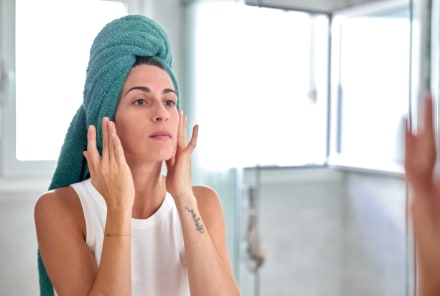Advertisement
Pearl Powder: The Complete Guide To Skin Care Benefits, History, Uses & More

I've always been fascinated by the ocean. With the majority of our planet being underwater, and 95 percent of the oceans being unexplored, there is endless magic to learn from the sea. And, much of our best nutritional resources come from the sea, be it marine veggies, micro algae or many adaptogens.
The adaptogenic kingdom, the diverse array of herbs and other earth medicines that help maintain balance in brains, skin, hormones, and inflammation. It is a favorite tool of many experts—holistic and not. Pearl powder is a one of these go-to adaptogens that hails from the sea. But how much do you know about it? For some, you may be well familiar or use it in your own routine already (in that case, consider this a brush up); for others, you likely need a bit more context. Here, all you need to know.
What is pearl powder?
Pearl powders come from the same pearls you know from jewelry (yes, the one your grandma wears as a necklace). Pearls are harvest from fresh and salt waters, and have many medicinal powders. To make the powder, first they boil the pearl to sterilize it; then they ground up the luminescent balls into a fine, light powder. This is what is used topically or taken orally like a supplement—and has been for generations all over the world.
Truly, the span of cultures who use this powder is vast: Cleopatra, queen of Egypt, was known to use pearl in her beauty regimen. The royal children of the pre-colonial Philippines were fed pearl powder to keep their skin bright, clear, and firm. Similarly, pearl was used throughout European history among royal and wealthy families for its beauty and health benefits. But no cultures have used pearl is such a concerted way as the two largest schools in Eastern medicine: traditional Chinese medicine and ayurvedic medicine.
How does pearl play into traditional Chinese medicine?
For centuries, since at least A.D. 320, Pearl has been used in traditional Chinese medicine (TCM). Wu Zetian, the only female empress in Chinese history and other royals used pearl for its revered beauty benefits. Skin health was very important in traditional Chinese culture, and pearl was the elite natural medicine to promote radiant youth.
This luminescent powder was not only used directly for skin health but also as a balancing adaptogen. In Chinese medicine, pearl is seen as a potent mind (shen) stabilizer, calming the mood like any good adaptogen. In TCM, if someone is struggling with anxiety or stress and tension, pearl is a go-to tool in many shen or mind adaptogenic tonics.
What's the role of pearl in ayurveda?
In traditional Indian medicine or ayurveda, pearl powder is also used for its anti-aging and adaptogenic benefits. Known as Mukta Pishti, pearl powder is used in ayurveda to calm heat in the body and bring coolness in the digestive system and balance inflammation in the body. Pearl was also an ingredient used in ayurvedic love potions, touted as an aphrodisiac.
Pearl powder's benefits: What the research says.
More and more, modern science1 is validating the ancient wisdom about pearl, primarily because of it's impressive nutrient content. While more research is needed to look into how much pearl powder can improve skin's appearance, we can certainly glean good information about it's many skin benefits from it's makeup:
- Minerals: Pearl powder contains over 30 trace minerals, a natural, whole food medicine array of calcium, copper, iron, magnesium, selenium, and silica. These nutrients are responsible for thousands of different important pathways needed for a healthy brain, hormones, immune system, and skin.
- Amino acids: Pearl also has many amino acids, several of them being essential amino acids (i.e., your body doesn't make them, but they are needed for your health). Amino acids are the building blocks of proteins, and help make up vital skin and hair structures such as collagen, elastin, and keratin.
- Conchiolin: Pearl also contains a special compound known as conchiolin. Conchiolin is what gives pearls their rainbow luminescence. This unique pearl protein promotes healthy collagen production, which results in plump, glowing skin. Conchiolin protein has similar effects to keratin, which is one of the proteins in your skin and hair and is able to improve hydration of skin cells, speed up cell metabolism, increase circulation, and help to repair damaged cells.
- Antioxidant boosters: The powder is thought to enhance two major antioxidants in the body, superoxide dismutase (SOD) and glutathione2. By enhancing these antioxidants' performance (it does so with it's nutritional profile), your body is better able to neutralize free radicals in the body, manage oxidative stress, and temper premature aging.
Cautions:
Generally considered a safe supplement to use, do be mindful if you are allergic to any of the minerals in the powder, such as calcium. As for the skin, always patch test prior to using any product topically.
Also, if you are vegan take note. Similar to bee pollen, pearl powder is technically not vegan, although many vegans find it acceptable to include food medicines like pearl powder and bee pollen in their diet.
How do you use pearl powder?
The two main. ways to incorporate pearl powder into your routine is through the inside via diet or outside via face scrubs and the like.
Ingesting.
Since pearl dissolves easily and has such a mild flavor (you can't really taste it at all), it makes the perfect addition to your favorite recipes. Personally, I love including it in my morning smoothie and teas throughout the day. Another great way to incorporate it is in soups or in bone broth that you can sip on. The collagen present in bone broth also plays a role in keeping skin looking youthful, so by adding pearl powder, you are just elevating the whole package. There is no limit to what you can do with pearl powder, so experiment and find a recipe that you love!
Topically.
Pearl powder is used in many beauty products. First, thanks to its luminescent properties, it's often added to foundations, setting powders, and various other makeup items like blush and shadow. This provides an alternative to plastic glitter or mica. It's also sometimes found in primers or face lotions for this same reason (adds a subtle sheen to the skin).
It's often also found in gentle face scrubs (versus having harsh nut powders or beads). If you want to DIY a scrub or mask, simply sprinkle in a bit of your pearl powder into rose water and mix until you create a paste. Apply for about 10 minutes, before rinsing off using small circular motions.

Will Cole, IFMCP, DNM, D.C., is a leading functional medicine expert who consults people around the globe, starting one of the first functional medicine telehealth centers in the world. Named one of the top 50 functional and integrative doctors in the nation, Dr. Will Cole provides a functional medicine approach for thyroid issues, autoimmune conditions, hormonal imbalances, digestive disorders, and brain problems. He is the host of the popular The Art Of Being Well podcast and the New York Times bestselling author of Intuitive Fasting, Ketotarian,The Inflammation Spectrum, and Gut Feelings.
More from the author:
Functional Nutrition Training
Check out Functional Nutrition Coaching
A cutting-edge nutrition deep dive taught by 20+ top health & wellness experts
Learn moreMore from the author:
Functional Nutrition Training
Check out Functional Nutrition Coaching
A cutting-edge nutrition deep dive taught by 20+ top health & wellness experts
Learn more
Will Cole, IFMCP, DNM, D.C., is a leading functional medicine expert who consults people around the globe, starting one of the first functional medicine telehealth centers in the world. Named one of the top 50 functional and integrative doctors in the nation, Dr. Will Cole provides a functional medicine approach for thyroid issues, autoimmune conditions, hormonal imbalances, digestive disorders, and brain problems. He is the host of the popular The Art Of Being Well podcast and the New York Times bestselling author of Intuitive Fasting, Ketotarian,The Inflammation Spectrum, and Gut Feelings.
Watch Next
Enjoy some of our favorite clips from classes
Enjoy some of our favorite clips from classes
What Is Meditation?
Mindfulness/Spirituality | Light Watkins
Box Breathing
Mindfulness/Spirituality | Gwen Dittmar
What Breathwork Can Address
Mindfulness/Spirituality | Gwen Dittmar
The 8 Limbs of Yoga - What is Asana?
Yoga | Caley Alyssa
Two Standing Postures to Open Up Tight Hips
Yoga | Caley Alyssa
How Plants Can Optimize Athletic Performance
Nutrition | Rich Roll
What to Eat Before a Workout
Nutrition | Rich Roll
How Ayurveda Helps Us Navigate Modern Life
Nutrition | Sahara Rose
Messages About Love & Relationships
Love & Relationships | Esther Perel
Love Languages
Love & Relationships | Esther Perel
